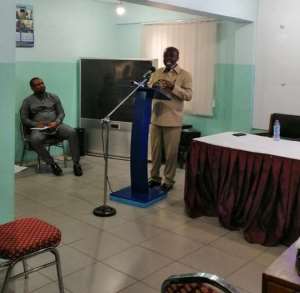
Resource persons at a media sensitisation workshop on COVID-19 for senior journalists, on Monday, cautioned practitioners against sensationalism and publishing opinions, saying these would undermine the national efforts at preventing the spread of the deadly bug.
Such reports would also stigmatise patients and discourage those suspected to be exposed to the disease from stepping out for testing.
They therefore, urged practitioners to only report facts and rely on information on the disease provided by the World Health Organisation and Ghana Health Service portals to arm the public with the knowledge they needed to stay protected, and seek treatment when necessary.
They should also seek answers to their queries from persons, who had been authorised from the district to the national levels by the technical teams for the purpose.
The resource persons were Dr Anthony Nsiah Asare, the Presidential Adviser on health; Information Minister Kojo Oppong Nkrumah, Deputy Information Minister Pius Hadzide and Mr Alex K. Abban, the Deputy Minister of Health.
The rest are Dr Justice Yankson, General Secretary of Ghana Medical Association, Dr Da-Costa Aboagye, the Director of Health Promotion and Chairman of the Risk Communication and Social Mobilization, GHS.
These were not normal times, they invariably stated, adding that it was therefore important to desist from rushing to publish information to scoop others, without validating facts.
All efforts should be geared towards encouraging protective behaviour and community spirit to ensure calm rather than spreading fear, they advised.
They should not announce confirmed cases or fatalities ahead of the designated authorities and also respect the rights of patients, including their privacy by not publishing their names without their consent.
Mr Oppong Nkrumah said the experience from China indicated that the media played a very critical role in providing information that empowered citizens to limit community spread.
In shaping the discussions on the disease, it was important for media practitioners to have deep knowledge, familiarise themselves with the technical information and present them in a professional manner.
Dr Yankson admonished them to follow their professional ethics in addition to the WHO protocol for reporting pandemics.
“The being the first to break the news syndrome will be fatal if we do not check certain facts,” he declared. “We will always want you to follow the best steps and in instances where you have the best lead, confirm with the appropriate person, otherwise in your rush you might send out messages that can be detrimental to the national efforts and confuse a lot more people”.
Dr Yankson said in order not to crowd the media space with people who were not professionals, a list of resource persons had been made available nationwide who could be contacted to speak with the media on the issue in accordance with national protocols.
Since in health matters, prevention was better than cure they should send out messages on the preventive measures to prevent a crisis.
Dr Nsiah Asare, the Presidential Adviser on Health, said the they should not spread myths, but encourage hope and compliance with the existing health protocols.
Mr Abban, advised against politicisation of the issues, sarcasm, cynicism and forcing opinions on others.
Mr Affail Monney, the President of the GJA, said this was not the time to stretch the truth, spin or politicise the issue, otherwise 'we all stand consumed in the end'.
Dr Da-Costa Aboagye, for his part, said the Government would intensify public education, which would be in a form of documentary, drama, information on mandatory and self-isolation to ensure adequate understanding for behaviourial change.
Citizens should maintain proper personal hygiene, eat healthily, have enough sleep and drink a lot of water, in addition to the prescribed social distance protocols.
He urged them to call the following emergency lines when they felt unwell and suspected to be carrying the virus: 112 , 0570607000 , 0570604000 , 0509497700 , and 0558439868 when they feel sick.
“People can also visit the WHO and ghanahealthservice.org/covid-19/ for more information on the disease,” he said.
Ghana has since Thursday, March 12, recorded 24 COVID-19 cases.
However, one person who had an underlining chronic pulmonary condition prior to being infected by the respiratory virus, died on Saturday.
The other 23 patients who are in isolation are responding to treatment.
---GNA




 People are celebrating their 80th birthday and Ghana owes GHS650 billion; who is...
People are celebrating their 80th birthday and Ghana owes GHS650 billion; who is...
 Beige-bank trial: Beige Bank disobeyed BoG — Prosecution
Beige-bank trial: Beige Bank disobeyed BoG — Prosecution
 NACOC staff arrested over cocaine smuggling
NACOC staff arrested over cocaine smuggling
 Controller and Accountant General resigns
Controller and Accountant General resigns
 Election 2024: Mute voices of politicians with 'sharp tongue' — Security Expert ...
Election 2024: Mute voices of politicians with 'sharp tongue' — Security Expert ...
 NDC opts out of Ejisu by-election
NDC opts out of Ejisu by-election
 Recommissioning of Ameri Power Plant an indication of clueless govt – NDC
Recommissioning of Ameri Power Plant an indication of clueless govt – NDC
 Love text message exposes pedophile
Love text message exposes pedophile
 Palm wine tapper kills wife over infidelity at Bogoso
Palm wine tapper kills wife over infidelity at Bogoso
 Dome Kwabenya: Mike Ocquaye washes woman panties for votes
Dome Kwabenya: Mike Ocquaye washes woman panties for votes
